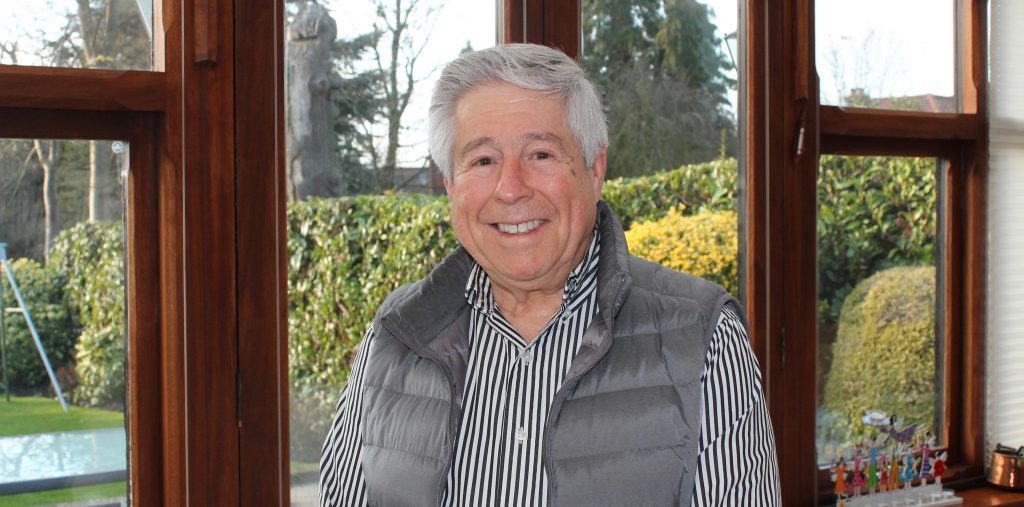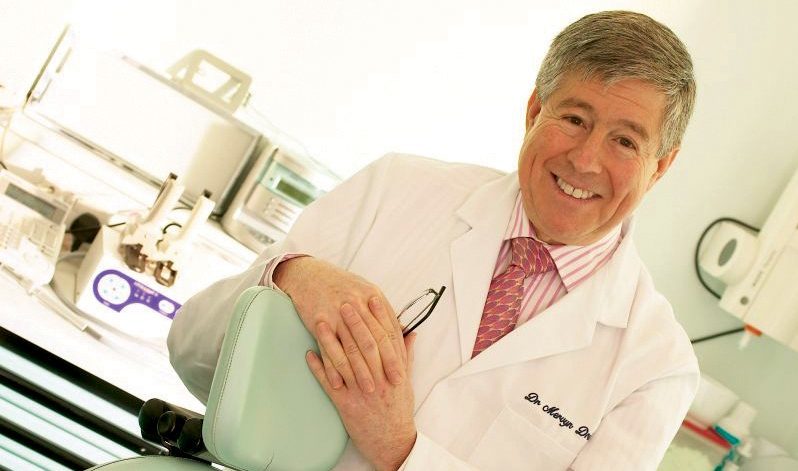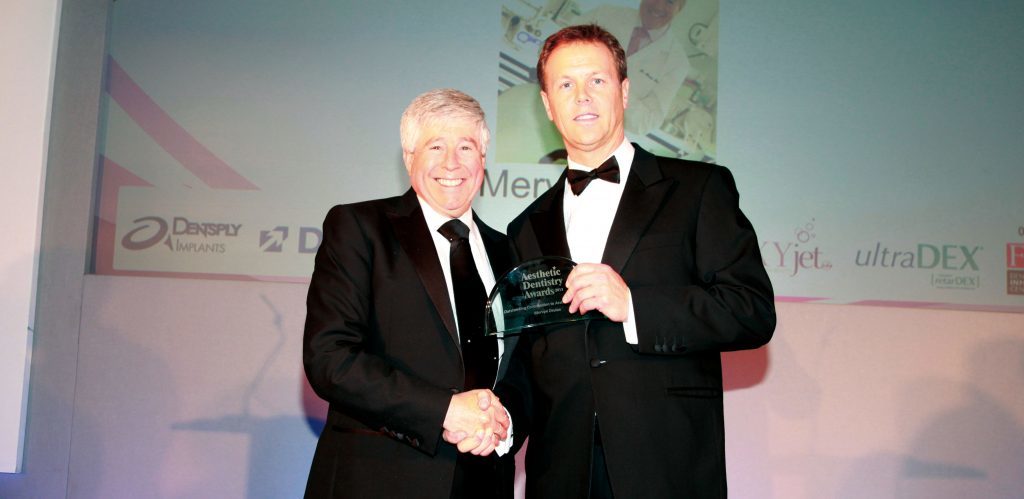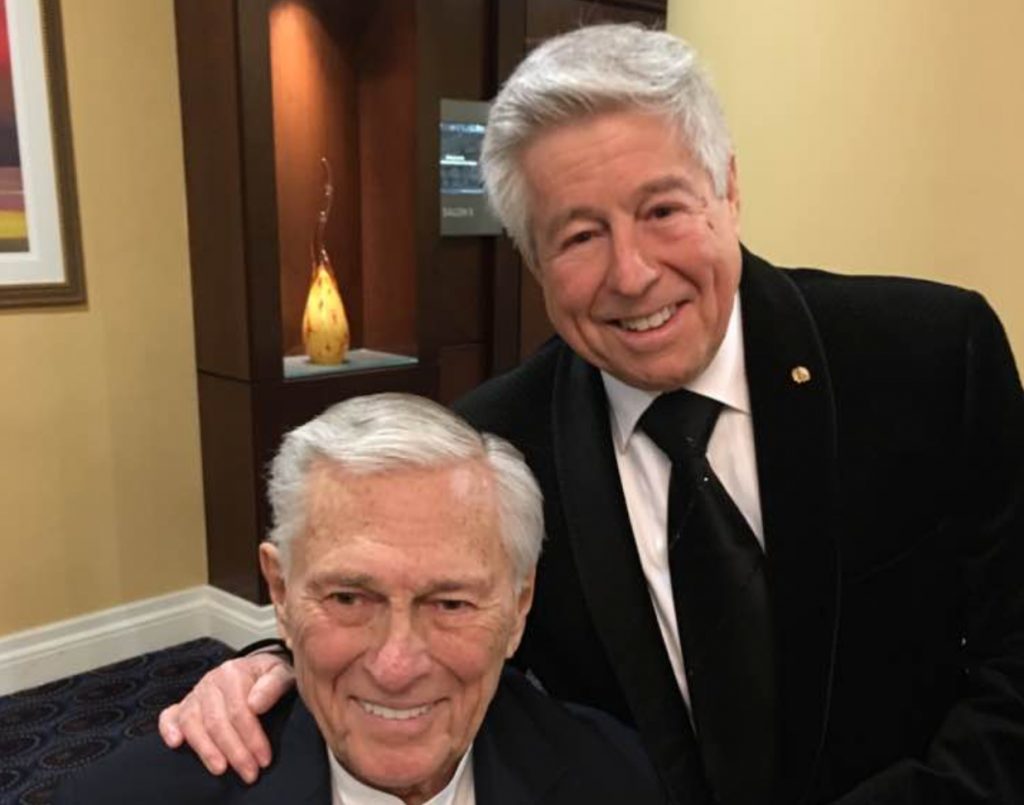 A true pioneer of cosmetic dentistry in the UK, Mervyn Druian speaks to Sophie Hatton about a career of innovation spanning nearly 50 years, and those that have influenced him along the way.
A true pioneer of cosmetic dentistry in the UK, Mervyn Druian speaks to Sophie Hatton about a career of innovation spanning nearly 50 years, and those that have influenced him along the way.
Dr Mervyn Druian is a name that every UK dentist should be familiar with. If you don’t know him as international president of the Alpha Omega Dental Society, perhaps you’ve heard of him as the principal of the acclaimed London Centre for Cosmetic Dentistry; board member and contributor to numerous dental journals, and speaker at educational events; as a fellow of the American Society of Dental Aesthetics; or as the go-to cosmetic dentist on TV’s Extreme Makeover.
Perhaps you saw Dr Druian pick up the Lifetime Contribution Award at the Aesthetic Dentistry Awards in 2013, or the meritorious award bestowed by the Alpha Omega Society in 2015. Or you might just know him as Mervyn, the affable gentleman with a South African twang and a sunny disposition.
Even if the answer to all the above is negative, Dr Druian’s impact on UK cosmetic dentistry is undeniable – and has arguably shaped the discipline more than any other dentist in the country. Over a career spanning nearly 50 years, Dr Druian has oft been heralded as the father of UK cosmetic dentistry – bringing the acclaimed Aesthetic Advantage Programme to our shores, and helping to found the British Academy of Cosmetic Dentistry, as well as running the highly successful London Centre for Cosmetic Dentistry whilst offering his valuable time to philanthropic pursuits. And these achievements are to name just a few.
The grand plan
On top of his numerous commitments – one of which is getting together with friends once a week to play bridge – it’s surprising that Dr Druian finds time to practise dentistry or spend time with his family, and is something that he marvels at himself: ‘Almost every evening of the week I have an Alpha Omega meeting to go to, or a study group, or a BDA meeting. My wife laughs, she says she’s lucky if I have one dinner a week at home!’
It’s all the more surprising to find out that Dr Druian nearly never became a dentist at all. ‘You won’t believe it – I was actually going to be an accountant in Johannesburg’, he reveals.
In fact, this dramatic career U-turn was brought about by the most heart-warming of reasons. ‘When I was a kid, we had this dentist who was so nice. A highlight of the school holidays was going to see him – we just loved uncle George!
‘When I started studying accountancy, I remembered George and how happy he was as a dentist. He was like a part of everybody’s family. I thought, that’s what I’d like. So, I applied late for dentistry, and I was very lucky and got accepted. And it’s been amazing.’
Since qualifying in South Africa in 1969, Dr Druian did what many newly qualified dentists from South Africa, New Zealand and Australia did, and came to the UK in the 1980s to work within the NHS. It was a move that Dr Druian admits he was quite comfortable with.
As a self-confessed ‘news junkie’, he says he enjoyed the cultural aspects of English life: ‘I really liked the lifestyle, and I loved the press! I already spoke the language – it was great!’
Moving to the UK was the kick-starter to Dr Druian’s remarkable dental journey. Now heralded as the UK’s foremost authority on cosmetic dentistry, Dr Druian’s career has taken a diverse trajectory, beginning with an area largely regarded as the gold standard of primary care dentistry today: oral hygiene and prevention.
‘I was a dental course addict back in South Africa’, Dr Druian explains. ‘I’d go to the States and Europe quite often to courses, and I was really obsessed with gum and periodontal disease, so I became very focused on preventive dentistry.’
The preventive approach was somewhat radical in the 1980s – at least within the parameters of the NHS, with its focus on reactionary treatment over prevention – and ultimately led Dr Druian to leave the NHS and move into private dentistry, where he was free to offer the type of care he believed in.
‘Prevention is something that’s always been very big for us. Today, I’ve got four hygienists that work with me’, he says.
An unexpected outcome of preventive dentistry, Dr Druian found, was the ease with which cosmetic dentistry followed. ‘As a result of preventive dentistry, you look to do better work.
‘Around this time in the 1980s, composite dentistry really got started, and as a result, we were able to provide aesthetic fillings for anterior teeth. Then manufacturers came up with the concept of etching and bonding, and as things progressed, we followed.’
Being a ‘dental course addict’ stood Dr Druian in good stead, enabling him to ride the crest of this new wave of cosmetic dentistry ahead his UK colleagues, leading him to become the first dentist in the UK to introduce porcelain veneers, and often leading the way in the adoption of new materials and techniques.
Dr Druian recalls: ‘Even when I left South Africa in 1983, they were years ahead of the UK as far as materials were concerned. In South Africa, we were already using light-cured materials back then.
‘It’s always better to stay ahead of the curve – it’s much easier to be ahead than to try and catch up.’
Independent dentistry
1983 was a monumental year for Dr Druian. As well as leaving his home nation, ’83 was the year that he set up practice in Belsize Park, London, which was eventually to become the London Centre for Cosmetic Dentistry. ‘We were doing preventive dentistry, but in 1989 the government changed the NHS dental contract, which made it very difficult for me to offer three-monthly hygiene appointments. There and then we decided to leave NHS dentistry.’
Dr Druian’s move into private dentistry reflected a wider change in the landscape of UK dentistry in the late 1980s and early 1990s, and the rise of ‘independent’ dentistry.
Soon afterwards, Ken Finlayson founded dental communications company FMC, and with it the introduction of the journal, Independent Dentistry (the forerunner to Private Dentistry, which celebrated 20 years in print in 2016). It’s a title that Dr Druian has been a valued contributor to since its inception.
In fact, Dr Druian is a major contributor to a number of dental journals and events. As well as sitting on the editorial advisory board of Private Dentistry, he is a board member of both Aesthetic Dentistry Today and Dentistry, and a judging panel member of the Aesthetic Dentistry Awards, the Private Dentistry Awards, and the Dental Industry Awards, where his expertise is often called upon.
‘Awards ceremonies are really important, because they make you a better dentist’, says Dr Druian. ‘They’re not a walkover; entrants have to do a lot of work to put their applications together, and therefore it concentrates their minds.
‘Awards raise the entrants’ standard of dentistry, and that’s all good. It’s good for the patients, and it’s good for dentists to be able to receive validation. From being a judge, I’ve learnt how high the standard can be. I’ve learnt how beautiful some practices are. What some of these practices look like – wow! They’ve done so well.’
What’s more, most recently Dr Druian chaired the successful Dentistry 17: Stars of Dentistry symposium in London in June, alongside Eddie Scher and Chris Barrow – a fitting tribute to the man that has inspired many of the experts in aesthetic dentistry that lectured at the event.
Honoured
Dr Druian is one of the most revered members of the awards’ judging panels, and for good reason. The last few years have seen him honoured in numerous ways, by colleagues, peers and organisations worldwide, including an award for Outstanding Contribution to Aesthetic Dentistry at the Aesthetic Dentistry Awards in 2013 (‘That was quite emotional; I didn’t expect it’); a fellowship of the American Society of Dental Aesthetics in 2014 (‘It’s nice getting an honour when you don’t seek it’); and the meritorious award from the Alpha Omega Dental Society in 2015 (‘Everybody knew. My family knew, my team knew, everyone. I never had a clue!’).
You’d be mistaken for thinking Dr Druian’s titles and honours stop there. The decorated dentist’s most recent – and, in many ways, most prestigious – accolade occurred last year, when he was named international president of the Alpha Omega Dental Society.
Alpha Omega – an educational and philanthropic organisation – is the oldest international dental association in the world, with chapters spanning the globe. As its international president, Dr Druian’s already busy diary is surely now bursting with appointments and engagements.
‘It’s a lot of work!’ he says. ‘But as dentists, we’re very lucky. We’re one of the few professions where we’re in control. With everything being equal, you should make a good living from dentistry. And if you make a decent living, you have to give something back.
‘That’s where Alpha Omega comes in. It was started in 1907 to counter racism and antisemitism. Now we have about 6,000 members worldwide, and around 500 in the UK. We run courses and lectures, and we do mentorship at no profit to ourselves. All the lecturers give their time for free and the profits go to helping underprivileged people.’
Alpha Omega was founded on a set of core principles: commitment, integrity, family, global oral health, inclusivity, leadership, and social justice. These are values, Dr Druian says, that are extremely important to him.
So what does this position entail? Judging by Dr Druian’s commitment to giving back to the community that has given him so much, I get the feeling that it’s a role that he won’t be taking lightly.
‘There are Alpha Omega chapters all over the world, so as president I try to get to some meetings – I’m going to Chicago next week and I’ll meet with the Chicago chapter. I’ll be hosting a dinner for about 100 people, and there will be Alpha Omega members coming from all over the world. I’ll speak to them, try to motivate them, fire them up.’
Founded in Baltimore 110 years ago, the Alpha Omega Society is prominent in the US, and it’s where a lot of the organisation’s charitable work takes place: ‘In America, there are still a lot of people who survived the Holocaust. They’re very old now, some of them are in their 80s, and some of them are really very poorly. Alpha Omega, together with Henry Schein, and some sponsorship from the American government, finds these people and does their dentistry for free.’
Inspiration
Another of Dr Druian’s latest and greatest honours was being named a fellow on the American Society of Dental Aesthetics (ASDA) in 2014 – making him only the second dentist in the UK to be presented with this accolade. The award is presented to dentists that have demonstrated commitment to the highest standards of care and advancement in the field of aesthetics.
The honour was bestowed on Dr Druian by ASDA co-founder, the late Dr Irwin Smigel, who is looked on by many as the father of aesthetic dentistry. Honouring Dr Druian was one of the last acts Dr Smigel completed before passing away in 2016.
‘I’m very honoured to have been made a fellow of ASDA. When I was given the honour, I said to Dr Smigel, “You have been so amazing for dentistry. You really are the father of cosmetic dentistry”. He said “Mervyn, you are the father of cosmetic dentistry in England”. I was so touched. It was such an honour coming from him.’
Dr Druian is a true admirer of the late Dr Smigel’s pioneering work; but who else would Dr Druian name as his inspirations? It’s not long before he mentions his partner at the London Centre for Cosmetic Dentistry, and close friend, Ken Spektor.
‘Ken and I have been partners for 30 years. Imagine meeting your business partner every morning for breakfast, having lunch together, and then if there were still things to talk about, we’d stop and have a coffee and share a cake. That was every day.’
Although Ken has left the practice for personal reasons, the pair’s relationship is as strong as ever. ‘We speak every day and I try to meet with him every week for lunch. He’s my closest friend.’
Elsewhere, Dr Druian stresses the importance of learning from those who inspire you. ‘In life, you need a mentor, and Dr Omer Reed was an amazing mentor to me’, says Dr Druian.
‘Omer was very famous for running practices profitably, running very high quality practices, and with a huge preventive side. That’s where I got this whole concept of three-monthly hygiene visits.
‘Then about 20 years ago, I saw this guy called Larry Rosenthal at the Chicago Midwinter Meeting. He was showing some really beautiful work. He was very approachable, so I asked him if he did any hands-on courses. He told me about his Aesthetic Advantage Programme.’
Dr Druian was so impressed with the Aesthetic Advantage Programme – which aims to teach dentists how to produce beautiful restorations and achieve a high level of practice potential – that he not only became the first UK dentist to take the course at advanced level, he brought the entire course to London so that UK dentists could benefit.
The success of the Aesthetic Advantage Programme in London, says Dr Druian, indirectly led to the formation of the British Association of Cosmetic Dentistry in 2003 – of which Dr Druian was one of the founders.
Continued innovation
Never content with the status quo and always striving to be at the forefront of his field, in the early 1990s, Dr Druian learned of a product called Ultradex from Omer. ‘It’s the most amazing product for looking after gums, and it also has a whitening effect on teeth. The main thing that it was really good for was for treating patients with bad breath’, says Dr Druian.
‘Up until the early ‘90s, that was a side of dentistry no one spoke about. So, we took the example from Omer, and became the first practice in London to treat patients for bad breath. We called it the London Breath Centre. People were coming from all over the country. We couldn’t believe it!’
Around the same time, Dr Druian came across in-surgery tooth whitening in the US and, in his usual style, decided to introduce it into his practice.
‘Whitening became a very big side to the practice so we called ourselves the London Tooth Whitening Centre – all at the same time as doing veneers and hygiene and everything else, so we eventually changed our name to the London Centre for Cosmetic Dentistry. When I think back to what we’ve done in dentistry, it’s actually quite a lot.’
There’s absolutely no denying that; the London Centre for Cosmetic Dentistry still continues to evolve, even in 2017. At the time of our chat, Dr Druian was preparing to introduce facial aesthetic treatments into his practice, implemented by his daughter, hygienist, Bernita Shelley.
Dr Druian has also been at the forefront of introducing a technique for calming nervous patients. The technique, called Nucalm, relaxes patients whilst boosting their immune system in a completely chemically free way.
‘It’s a sedation technique but without drugs. You work with a cranial stimulator that you put behind the ears and you have headphones that have special music playing, or calming sounds like the sea waves. It’s got two beats going through each ear – you can’t hear the beats but it’s hypnotic.
‘It hypnotises the brain and takes it to a pre-sleep state. It’s so amazing. I use Nucalm myself every second night, because I’m an insomniac and it chills me. It’s fantastic!’
Of the many areas that Dr Druian has focused on, from preventive dentistry at the beginning of his career, through to cosmetic restorations, whitening and sedation techniques, I’m curious to know if he has a favourite discipline.‘I’m happy doing anything! I don’t mind. I just like being with people’, he says. And this is perhaps the truest reflection of Dr Druian’s character.
Besides the awards, the honours and the innovations, just like uncle George, the dentist that inspired him all those years ago, Dr Druian is happy because he makes other people happy. Isn’t that the best reward of all?





